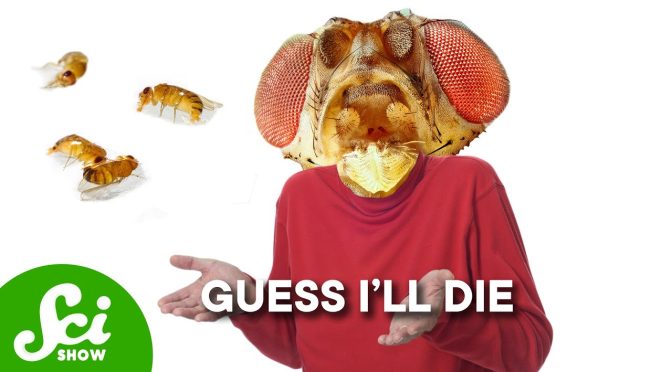Based on the video titled “Why Flies Die When They See Dead Flies” by SciShow. The perception of death is not unique to humans. Various species exhibit different reactions when confronted with the demise of their kind. Fruit flies, in particular, present a curious case: upon witnessing the death of their peers, they undergo rapid aging and may even die prematurely. This phenomenon, while perplexing, offers insights into the potential connections between perception, aging, and mood disorders in humans.
Contents
- Death Perception Across Species
- The Role of Sensory Perception
- Sensory Perception and Aging
- The Serotonin Connection
- Implications for Human Health
- Conclusive thoughts
- The video
Death Perception Across Species
Many animals have evolved to recognize and respond to death. Honeybees, for instance, identify and remove deceased members from their hive. Scrub Jays hold vocal gatherings around their deceased, and elephants display mourning behaviors, such as attempting to lift a fallen comrade. However, fruit flies stand out with a unique reaction: they age faster and may die upon perceiving the death of their kind.
The Role of Sensory Perception
The avoidance behavior of fruit flies towards their deceased peers seems to be driven by both visual and olfactory cues. Experiments using a T-maze, a chamber used to study animal preferences, revealed that flies actively avoid areas containing dead flies. This aversion was particularly strong when the flies could both see and smell the deceased. Furthermore, exposure to dead flies led to physiological changes in the living flies, such as altered metabolic rates and reduced fat storage.
Sensory Perception and Aging
There’s a notable link between sensory perception and aging in certain invertebrates. In fruit flies and nematodes, neurons used for smell and taste can regulate aging and lifespan. For instance, when fruit flies are exposed to the smell of nutrients, it negates the lifespan-extending benefits of a restricted diet. Similarly, honeybees exposed to pheromones from potential future queens have a significantly reduced lifespan.
The Serotonin Connection
Serotonin, a neurotransmitter often associated with mood in humans, seems to play a pivotal role in this phenomenon in fruit flies. Flies lacking serotonin receptors can live longer under food scarcity. Research from the University of Michigan pinpointed a group of neurons with serotonin receptors in the ellipsoid body of the fly’s brain. These neurons become active after exposure to dead flies and appear to be crucial for the observed rapid aging. Disabling these neurons or their serotonin receptors negated the lifespan-shortening effect of witnessing death.
Implications for Human Health
While humans don’t experience accelerated aging upon witnessing death, the fruit fly research offers intriguing insights. The involvement of serotonin and its link to a “depression-like state” in flies raises questions about the relationship between depressive symptoms, serotonin, and aging in humans. Although the research is in its early stages, understanding these connections could pave the way for breakthroughs in human health and well-being.
Conclusive thoughts
The intricate dance between perception and physiological response in fruit flies serves as a stark reminder of the interconnectedness of life’s processes. While humans may not mirror the exact reactions of these tiny creatures, the underlying principle remains: our perceptions, emotions, and experiences can have tangible effects on our well-being. The study of fruit flies, therefore, not only unravels the mysteries of their existence but also prompts us to reflect on the profound impact of our own perceptions on our health and lifespan.
In the grand tapestry of life, every organism, no matter how small, holds lessons that can reshape our understanding of existence. The fruit fly’s response to death is not just a biological phenomenon; it’s a philosophical inquiry into the nature of life, death, and the delicate balance in between. As we delve deeper into the world of these flies, we are also invited to introspect, to question the nature of our own perceptions, and to consider how they shape the trajectory of our lives.
Lastly, the intertwining of sensory experiences with lifespan underscores a universal truth: life is not merely a series of events but a complex interplay of experiences, perceptions, and reactions. The fruit fly’s accelerated aging upon witnessing death serves as a poignant metaphor for the human experience, where our perceptions can either enrich our lives or hasten our decline. It’s a call to be mindful of our experiences and to recognize the profound power they hold over our destinies.

